How to Prepare for Social Science Class 10? PDF Download
Exams can be overwhelming and stressful, especially when it comes to Social Science. With its vast syllabus and facts, it is a challenging subject which requires a lot of practice and hard work. However, with the right approach and preparation, it is possible to ace your Social Science Exam in Class 10 CBSE. In this guide EduRev experts have analysed the habits and strategies of toppers to make a plan for you that will assure 95+ marks in final examination. Read on to find out how you can plan your preparation, practise the right way, and ace your Social Science Exam with flying colours.
Step By Step Preparation Tips for Class 10 Social Science 2023
Step 0: Pre-Preparation Checks for Class 10
Before starting your preparation it is important to take notes of few points that are followed by toppers that set them apart from other students:
- To achieve success in Class 10, it is important to eliminate distractions such as social media and maintain a consistent study schedule.

- Setting specific goals for each day and working towards them, even if it takes longer than expected, is key.
- To effectively prepare for the exam, it is helpful to create a study plan that is based on the exam date and syllabus or the desired number of hours spent studying each day.
- Taking regular breaks is important to reduce stress and improve overall health, as well as to enhance the ability to retain information.
- Maintaining a healthy sleep pattern is essential for both physical and mental well-being, as it can improve concentration and memory while preventing burnout. On the other hand, not getting enough sleep can negatively impact health and hinder exam preparation.
Step 1: Understanding the Syllabus and the Exam Pattern
The syllabus for Social Science in Class 10 CBSE is vast, covering subjects such as Economics, Geography, Political Science, and History. It is important to know the syllabus properly, as well as the number of marks allotted to each section. This will help you to create a study plan and allot time for each subject accordingly. You should also refer to the exam pattern for Social science, which will help you understand the type of questions that will be asked in the exam. The important points regarding the exam pattern as well as the syllabus are given below:
- The exam will have 6 sections.
- The exam will be of 80 marks. Internal assessment will be of 20 marks.
- The internal assessment is divided into 3 parts as follows:
1. Pen Paper Test and Multiple Assessment (5+5)
2. Lab Practical - 05 marks
3. Portfolio - 05 mark - From the table given below, it has become clear that you’ll have to study multiple choice questions, very short answer type questions, short answer type questions, long answer type questions, Case-based type questions and questions regarding maps.
EduRev has got your back if you want to practise all the different types of questions mentioned above. EduRev Course for Class 10 Social Science provides MCQ questions, short and long answer questions and assertion- reasoning type questions. You will have to base your practice on these types of questions. - Internal choice will be provided in the questions.
The following table briefly discusses the 6 sections of the exam.
Section | Type of questions | Number of questions | Marks per question | Word limit |
1 | Multiple Choice Questions | 20 | 1 | - |
2 | Very Short Answer | 4 | 2 | upto 40 words |
3 | Short Answer | 5 | 3 | upto 60 words |
4 | Long Answer | 4 | 5 | upto 120 words |
5 | Case based Questions | 3 | 4 | - |
6 | Map based questions | 1 with 5 sub-parts | 5 | - |
The Social Science exam has 4 books/subjects namely
- India and the Contemporary World – II
- Contemporary India – II
- Democratic Politics - II
- Understanding Economic Development
The weightage of different books is given below:
Units | Marks |
India and the Contemporary World - II Section 2: Livelihoods, Economies and Societies Section 3: Everyday Life, Culture and Politics | 20 |
Contemporary India - II: Resources and Development, Forest and Wildlife, Water Resources, Agriculture, Minerals and Energy Resources, Manufacturing industries. Life Lines of National Economy | 20 |
Democratic Politics - II: Power Sharing, Federalism, Gender, Religion and Caste, Political Parties, Outcomes of Democracy | 20 |
Understanding Economic Development: Development, Sectors of the Indian Economy, Money and Credit, Globalization and the Indian Economy, Consumer Rights (To be used only for Project Work) | 20 |
Total | 80 |
internal Assessment | 20 |
Grand Total | 100 |
The deleted topics are given in the table below:
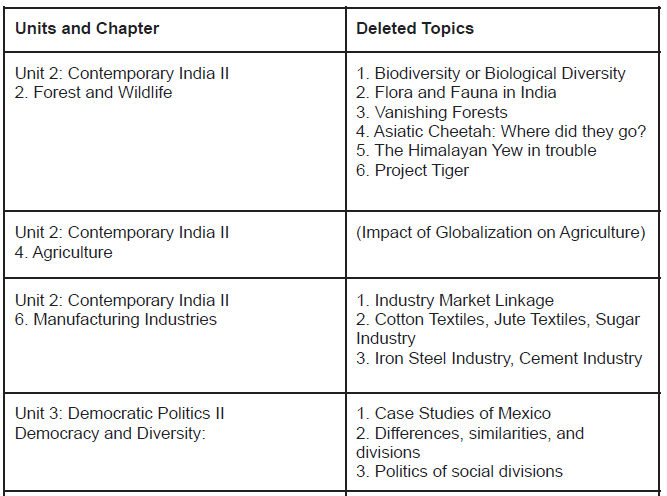
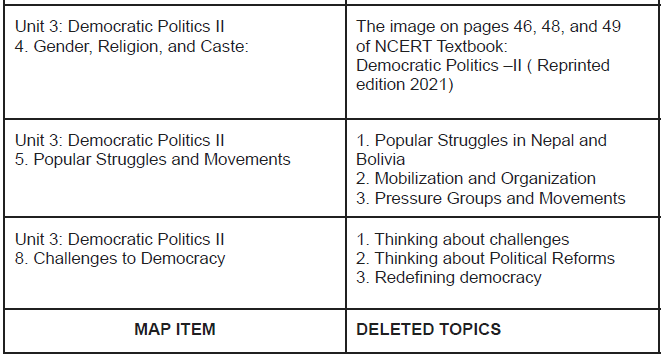
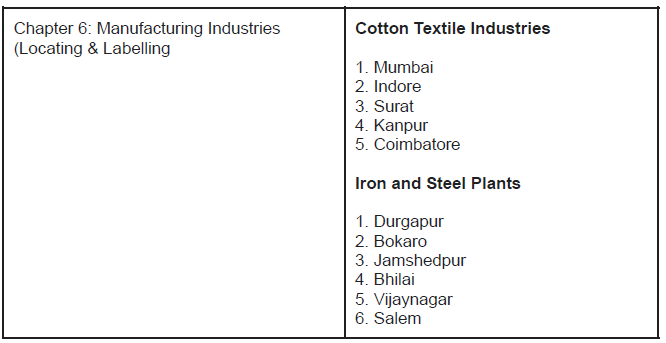
Step 2: Learn how to Study Class 10 Social Science Efficiently
The reason most of the students are afraid of Social Science is because of its huge syllabus and many students also find it difficult to remember so much information in the exam. The following steps were followed by toppers to tackle the above mentioned issues and score 100/100 marks in the exam:

1. Read NCERT’s line by line - The first question that arises in most of the students mind is which book should be followed. Toppers emphasise again and again that NCERT is the most important book for Class 10 Social Science Preparation and it should be read line by line. Underline important points and make notes of the topics that are important. After reading NCERT once, read it again and this time try to think about questions that may be asked from different topics. This will help you to gauge the type of questions that will come in the exam.
2. Should refreshers be followed? - You should not depend on refreshers for your Class 10 Social Science preparation. Many solutions provided in the refreshers are incorrect. If you still want to follow refreshers then only use them to practise different types of questions and then read answers from NCERT. This is the correct way to use refreshers.
3. Practise maps questions directly on map - Purchase maps so that you can practise map questions on them. Study maps from NCERT and then draw the various features mentioned in the syllabus on the maps.
4. Use mind-maps and flashcards to memorise facts - In Social Science, especially history, students have to learn a lot of dates, names and various other facts. To memorise these facts you can use mind-maps and flashcards. You can learn how to use flashcards here and mind-maps here.
5. Read information in the boxes - Many times students do not read the information given in the boxes but questions do come from them. So it would be wise to read them properly.
6. The missing ingredient - Studying Social Science can become monotonous sometimes. So the only way by which you’ll be able to follow the above mentioned steps is if you feel that social science is interesting. Hence we come to the missing ingredient. Tips to make Social Science interesting are given below:
(i) History - History is nothing but a collection of stories about events and people from the past. Read those topics like stories. EduRev provides interesting videos to make history interesting.
(ii) Political Science - Political Science is interesting because it involves studying about what is happening in the politics of the country.
(iii) Geography - Study geography like you are going on an adventure around the world.
Important topics - While preparing for any exam it is important to revise the important topics again and again. To do so you need to know what important topics to study from each chapter. Check out the important topics in the table given below:
Chapter | Important topics |
Types of soils and soil erosions Steps of resource development Definition of Resources Earth summit and Agenda 21 | |
What are multipurpose projects? Causes of water pollution Pros and Cons of dams Rain water harvesting in India | |
Definition of different types of farming Types of cropping patterns Crops and their climate requirements Agriculture reforms made in India Effect of globalization | |
Modes of occurrence of minerals Conventional vs. unconventional minerals Types of iron ores and coal Map work | |
Types of industries Importance of industries Location of industries Concentration of steel industry | |
Importance of transport and communication Why roadways better than railways? Distribution of railways Pros and cons of waterways and airways International trade as economic barometer | |
Why are goals conflicting and mixed? National income and other parameters What are public facilities and their importance HDI vs Average income What is sustainable development and its importance | |
Barter system and double coincidence of wants Role of RBI Definition: Collateral, cheque, DD, SHG Why loans in formal sector expand? Functioning of SHGs | |
Def: Globalisation, MNCs, SEZs, Foreign trade, foreign Investment How MNCs integrate production Prosand cons of globalisation Negative Impact of globalisation How can we make trade easier | |
Accommodation in Belgium - Steps given in book Majoritarianism in Sri Lanka Vertical vs horizontal Power Sharing Why is power sharing necessary - 2 reasons | |
Unitary vs Federalism {all features) Flolding together vs coming together Flow is India federal? Def: decentralisation. Its steps | |
Sexual division of labour Def: feminism, communalism, casteism, secular nation Flow is India secular? Flow is caste expressed in politics? Flow is politics expressed in caste? | |
Components of Political Parties Functions of Political Parties Necessity of Political Parties (4 points) Criteria for National and state party Features of national parties Challenges and solutions | |
First painting Role of Napoleon and his fall Role of France in spreading nationalism Conservatives vs Revolutionary Why is Greece called cradle of civilisation Metternich about France and Mazzini What is Romanticism? Role of culture/language Economic Hardship - Reasons What was revolution of liberals and its fall Unification: Italy, Germany and Britain Def: Allegory and its features Balkan Conflict | |
Meaning of satyagraha WWI and changes in India Non-cooperation: cities and villages Plantation workers and swaraj NCM vs CDM 20th century, changes What was Simon Commision? Salt March, Why salt? Who participated and who didn’t in CDM? Methods of unification and nationalism Poona pact, what and why? Khilafa? Khilafat movement - why? | |
First two paintings What was Proto industrialisation? Flow did it work? Why was pace of industrialization slow in Britain? Problems faced by workers in Victorian britain Changes brought by Manchester clothes in India Flow did Britishers establish supremacy in Indian trade? (Gomasthas included) WWI and changes in Indian trade Who were Jobbers? Why were they important? Who were early entrepreneurs? How did they get money? 19th century marketing tactics in India | |
What was silk route? How were India and China involved in it? Food: Life and Death | Irish famine El Dorado | Spanish conquerors and USA Corn laws: meaning and consequences Canal colonies: where and why Role of technology in globalisation How did Europeans colonised Africa? Who were Indentured labourers? How did they survive in colonies? Opium trade WW1 and its implications Henry Ford and Mass production in USA Consequences of Great Economic Depression | |
Growth of Print in Imperial China How did print come to Europe? Gutenberg Printing press Print Revolution (5 points) Role of print in French Revolution All the technological changes in print Indian manuscripts: pros and cons Print and religious debates (Hindus and Muslims) Print and women from conservative families Print and workers/poors in India Vernacular Press Act |
Step 3: Attempt Previous Year Question Papers and Mock tests
Preparing for the CBSE Class 10 Social Science Board Exam can be made easier with the help of past years' question papers. It can give you an idea of the exam pattern, the type of questions that are asked, and the time management skills required. EduRev, a leading online learning platform, offers previous year question papers and mock tests for the CBSE Class 10 Social Science Board Exam, which can help you get an edge over other candidates. By attempting EduRev's mock tests, you can assess your preparation level, identify your strengths and weaknesses, and improve your time management skills. With EduRev's comprehensive set of resources, you can ensure a smooth and successful endeavor for the CBSE Class 10 Social Science Board Exam 2023.
Step 4: How to Write the Social Science Exam in a Proper Elaborated Way?
All the toppers emphasise on a point that the structure of the answer in the exam matters a lot. So that it becomes easier to write answers in the correct format in the exam, it is essential to practise writing answers from the start of the preparation. A part of the sheet of the topper is provided below: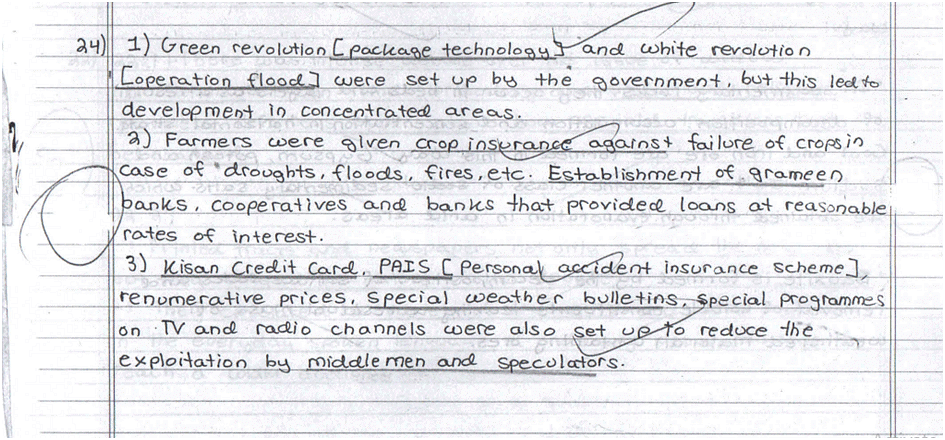 Part of Topper's Answer sheet
Part of Topper's Answer sheet
Clearly observe the answer sheet to see the structure of the answer.
- The answer is written in points. For a 3 mark question, you need to write at least three points. Provide heading for each point where possible.
- For answers related to history, provide dates where possible even if not asked. One such example is given below.
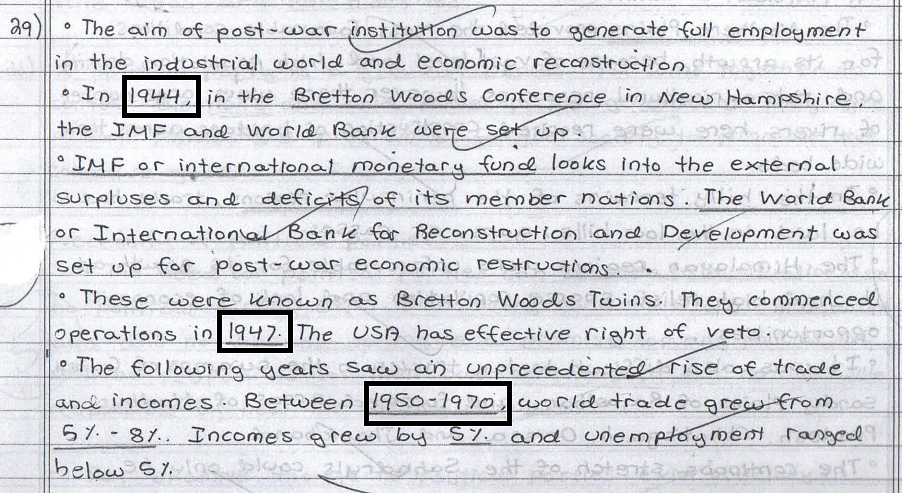 Part of Topper's Answer Sheet
Part of Topper's Answer Sheet - For answers related to geography draw flowcharts for better presentation.
Let’s see the answers provided by CBSE for the sample paper below. The question given below should is of 3 marks. So you have to write any 3 points from the 4 points given below.
In what ways Multinational Corporation (MNC) different from other companies? Explain with an example.
(i) Domestic companies tend to restrict their operations to the country of origin, while multinational corporations operate in more than two countries. Ex- Infosys
(ii) Companies (Infosys) expand globally for many reasons, mostly to obtain new markets, cheaper resources and reduction in operational costs, all of which significantly affect financial management. These benefits also increase the risks faced by multinational corporations.
(iii) Multinational (Infosys) financial management differs from domestic financial management in six essential ways
(iv) Unlike their domestic financial management counterparts, multinationals are subject to exchange rates that differ based on the prevailing inflation rate in the foreign countries where they operate.
You should check out the latest CBSE sample paper and the marking scheme for Social Science to understand how answers will be marked. You can also check out the answer sheets of toppers here.
Step 5: What Should be Your 3 Months Strategy Before the Exam?
Your strategy in the last 3 months is important to score above 95 in Class 10 Social Science exam. Your last 3 months preparation should be focused on revising the concepts you have studied. However, simply practising is not enough; it is important to practise correctly in order to achieve perfection. Follow the steps given below to practise perfectly:
- Solve sample papers in exam setting - While solving sample papers and past year papers solve this under exam conditions so that you are fully prepared about attempting the exam. You will learn the pattern of the exam and the level of questions asked in the exam. You can check out sample papers and past year papers here.
- Identify the sequence in which to attempt the exam - When you are solving sample papers and past year papers, you’ll be able to judge in which sequence you should attempt the exam. Should you attempt the section with long answers first or should you attempt MCQs first?
- Get your answers checked by experienced teachers - When you are solving sample papers, get your answers checked by experienced teachers and ask them to point out your mistakes. In this way, you’ll get to know your weak points and you can improve them.
- Revise your weak chapters first to become confident - While revision practise your weak chapters first so that you gain confidence in them. It will make you more confident in your preparation. Revise the important topics again and again to really memorise them
- Use mind maps to revise topics - Mind maps are really helpful in revising the formulas and topics. Check them out here.
If by any chance you are behind in your preparation and need to speed it up, EduRev has a complete crash course for Class 10. Check it out here.
Step 6: Do's and Don'ts of Exam Day
Imagine you have worked hard and the day is here. By taking note of these few important points you can make sure that your preparation was worth it.
- Read the question paper carefully and quickly eliminate difficult questions where internal choice is given.
- This point has been repeated multiple times, that is because it is important. Write your answers in the proper format. Take special note of the word limit. Write your answers in points and highlight key points. Do not exceed the word limit. Check the marking scheme in the sample paper. Draw flowcharts if time permits. Underline important key words in the answer.
- Think before you write an answer as it will prevent any unnecessary corrections.
- Do not change the answers unless you are 100% sure. Most of the time the first answer that you think is the correct answer.
- If you get stuck on a question, do not spend too much time on it. Leave it and you can get back to it at the end of the exam.
- Do not read new topics on the day before the exam as it will create confusion.
- If time permits, draw lines after answers so that your answer sheet appears clean.
Class 10 Social Science Preparation: How can Parents Help Their Child?
- As a parent, it is important to assist your child in staying organised while studying for various subjects, especially if they are also participating in extracurricular activities. Class 10 marks are particularly significant, so it is necessary to plan ahead and manage time effectively to ensure that all subjects receive adequate attention.
- One effective method for doing this is by encouraging your child to divide their work into smaller, more manageable chunks and to create and follow a study schedule to avoid trying to cram all studying into one evening.
- Taking thorough notes in class, organising those notes by subject, and reviewing them with you when you get home can also be beneficial.
- Practice tests, such as those offered by EduRev, can be a useful tool for reinforcing knowledge and identifying areas for improvement.
- After completing practice tests, it is essential for your child to carefully review their results and use the assessment features provided by EduRev to identify their weaknesses and track their progress.
- It is also important to consider your child's interests and learning style when developing their study plan. By having discussions with your child and working together to reach a mutual agreement based on their interests and preferences, you can help them feel more motivated and engaged in their studies.
Future in Social Sciences
There are many career options available for individuals with a degree in Social Sciences. Some of the fields you might consider include:- Law: After studying arts in Class 12, you could study law. You can become a lawyer, representing clients in legal proceedings. Alternatively, you could work as a paralegal, providing support to lawyers and helping to prepare cases.
- Journalism: You could work as a journalist, reporting on social issues and their impact on communities. You could also work as an editor, helping to shape and refine the content produced by journalists.
- Education: With a degree in Social Science, you could become a teacher in a variety of settings such as public or private schools, or specialised education programs. Another option would be to work as an educational administrator, managing the day-to-day operations of a school or educational program.
- Business: Social Science skills are also highly valued in the business world. You might work in marketing, developing and implementing strategies to promote products or services. You could also work in human resources, helping to recruit, train, and retain employees. Alternatively, you might work in management, overseeing the operations of a business or organisation.
- Government: A degree in Social Science can also lead to a career in government. You could work in policy analysis, researching and developing policies that address social issues. You could also work in urban planning, helping to design and develop communities. Another option would be to work in public administration, managing the operations of a government agency or program.
- Nonprofit organisations: Social Science degree holders are also in high demand in nonprofit organisations. You might work in fundraising, developing and implementing strategies to raise money for the organisation. You could also work in community development, helping to build and strengthen communities. Another option would be to work in social work, providing direct services to clients.
- Healthcare: You could become a social worker in a healthcare setting, helping patients and families navigate the healthcare system and access resources. Another option would be to work as a health services manager, overseeing the operations of a healthcare facility or program.
- Politics: A degree in Social Science can also lead to a career in politics. You could become a political scientist, studying the impact of policies and political systems on society. Alternatively, you could work in public affairs, helping to shape and communicate the policies and positions of political candidates or organisations.
- Research: You might work as a researcher in a variety of settings, studying social issues and their impact on communities. You could also work as a data analyst, helping to collect, analyze, and interpret data to inform policies and programs.
There are many other career options available with a degree in Social Sciences, so be sure to explore your options and find a field that aligns with your interests and goals.
Frequently Asked Questions (FAQs) on How to Prepare for Class 10 Social Science?
Is NCERT enough for the Class 10 Social Science exam?
The most important book for Class 10 Social Science preparation is NCERT, which should be read carefully, underlining important points and making notes. After reading it twice, students should try to think about potential exam questions. For added assistance, you can check out the NCERT solutions for Class 10. Once finished, move on to the NCERT Exemplar for more practice - it contains numerous MCQs, which will be helpful when it comes to the final exam. Since MCQs make up 20 marks of the exam, it is vital to practise them. Refreshers should not be relied upon and can only be used to practice questions with the answers being read from NCERT.
How vast is the CBSE Class 10 Social Science syllabus?
The CBSE Class 10 Social Science syllabus is vast as it consists of 22 chapters divided across four sections – History (5 chapters), Geography (7 chapters), Political Science (5 chapters) and Economics (5 chapters). For complete syllabus of Social Science, you can view the document CBSE Class 10 Syllabus - All Subjects.
Where can I download CBSE Class 10 Social Science previous year’s question papers?
Previous year question papers is a great resource for Class 10 students who want to prepare for their upcoming exams. EduRev has a collection of Class 10 previous year questions which can help you to familiarize themselves with the exam pattern, question types and difficulty levels. Additionally, it also helps to identify the topics and subtopics which are frequently asked in the exams.
Which subject is easy in class 10?
The level of difficulty of a subject can vary from person to person, as it may depend on individual strengths, interests, and study habits. However, generally speaking, subjects like mathematics and science may be considered more challenging for some students, as they involve a lot of formulas, problem-solving, and concepts that need to be understood and applied. Whereas subjects like English and Social Science may be considered less challenging for some students as it involves more of reading, writing and understanding the passages. That being said, it's important to remember that even if a subject is considered "easy," it still requires effort and dedication to achieve good grades.















